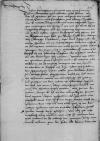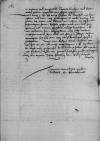Aus Euer E(rbarkei)t cf. Gdańsk Town Council to Ioannes DANTISCUS Gdańsk (Danzig), 1546-08-13, CIDTC IDL 4647⌊schreibenncf. Gdańsk Town Council to Ioannes DANTISCUS Gdańsk (Danzig), 1546-08-13, CIDTC IDL 4647⌋ / hab wir gerne vornhomen, / das dieselbte aus des edlenn unnd erenvhestenn hern Georg Schewecke (Georg Scheffke) (*1491 – †1547), 1522 Gdańsk alderman; 1525 - town councillor; 1528 - judge; 1531 - mayor; 1536-1537, 1540, 1542-1545 - burgrave; 1534 Gdańsk envoy to convention in Lüneburg in affairs of seafaring and conflicts with Lübeck (AT 15, p. 501, 510; AT 16/1, p. 42, 44; ZDRENKA 2, p. 275)⌊Georgen ScheffkenGeorg Schewecke (Georg Scheffke) (*1491 – †1547), 1522 Gdańsk alderman; 1525 - town councillor; 1528 - judge; 1531 - mayor; 1536-1537, 1540, 1542-1545 - burgrave; 1534 Gdańsk envoy to convention in Lüneburg in affairs of seafaring and conflicts with Lübeck (AT 15, p. 501, 510; AT 16/1, p. 42, 44; ZDRENKA 2, p. 275)⌋, / Euer E(rbarkei)t mittels burgermeister / und unsers vilgeliebten schwagern, einbringenn / das ihenige, so wir mit ihm beredt, / bey sich weitleuftig bewogenn / und ihre mheinung rathsweis uns darauf habenn lassenn wissenn, / dergleichenn auch gethann hatt der wolgebornne unnd edell herr Stanisław Kostka (*1487 – †1555), as a leader of the so-called nobles' party active in Royal Prussia since 1536, Kostka stood in opposition to most of the members of the Council of Royal Prussia, who wanted to maintain the autonomy of the province and a "balance of power" in terms of governance. The tension between the Prussian Subtreasurer and the Council had been increasing since the Diet in Graudenz (Grudziądz) in 1533. Kostka, connected with the royal court since his youth, was sent to Graudenz as the King's deputy and, contrary to custom, decided to take part in the proceedings. In response to such a step, the Council members stopped the meeting. Kostka accused them of hostility towards the Poles and intervened on this matter at the court. In the absence of the then Bishop of Ermland (Mauritius Ferber) it was Dantiscus who chaired the Graudenz Diet. The incident badly harmed his future relationships with Kostka; 1531-1555 Treasurer of the Prussian lands and Treasurer of Marienburg (Malbork); 1544-1545 Castellan of Elbing (Elbląg), 1545-1546 Castellan of Kulm (Chełmno); 1546-1549 Vice-Voivode of Kulm; 1546-1551 Voivode of Pomerania; 1551-1555 Voivode of Kulm (PSB 14, p. 356; Urzędnicy 5/2, p. 216; MAŁŁEK 1976, p. 119-123)⌊Stentzel KostkaStanisław Kostka (*1487 – †1555), as a leader of the so-called nobles' party active in Royal Prussia since 1536, Kostka stood in opposition to most of the members of the Council of Royal Prussia, who wanted to maintain the autonomy of the province and a "balance of power" in terms of governance. The tension between the Prussian Subtreasurer and the Council had been increasing since the Diet in Graudenz (Grudziądz) in 1533. Kostka, connected with the royal court since his youth, was sent to Graudenz as the King's deputy and, contrary to custom, decided to take part in the proceedings. In response to such a step, the Council members stopped the meeting. Kostka accused them of hostility towards the Poles and intervened on this matter at the court. In the absence of the then Bishop of Ermland (Mauritius Ferber) it was Dantiscus who chaired the Graudenz Diet. The incident badly harmed his future relationships with Kostka; 1531-1555 Treasurer of the Prussian lands and Treasurer of Marienburg (Malbork); 1544-1545 Castellan of Elbing (Elbląg), 1545-1546 Castellan of Kulm (Chełmno); 1546-1549 Vice-Voivode of Kulm; 1546-1551 Voivode of Pomerania; 1551-1555 Voivode of Kulm (PSB 14, p. 356; Urzędnicy 5/2, p. 216; MAŁŁEK 1976, p. 119-123)⌋ vonn Stangenberg (Sztembark), village Ermland, ca. 17 km SE of Sthum, estate of Kostka family; today Stążki in northern Poland⌊StangenbergStangenberg (Sztembark), village Ermland, ca. 17 km SE of Sthum, estate of Kostka family; today Stążki in northern Poland⌋, culmischer castellann etc. Royal Prussia (Prussia Regalis), region, part of Prussia annexed to the Kingdom of Poland in 1466 under the provisions of the Second Peace of Thorn⌊dieser landeRoyal Prussia (Prussia Regalis), region, part of Prussia annexed to the Kingdom of Poland in 1466 under the provisions of the Second Peace of Thorn⌋ schatzmeister uf unnser schreibenn, / das wir auch desselbigenn lauts / mit abschrift des ko(nigliche)n negstenn cf. Sigismund I Jagiellon to Ioannes DANTISCUS & Tiedemann GIESE Cracow, 1546-07-17, CIDTC IDL 6159⌊antwurtscf. Sigismund I Jagiellon to Ioannes DANTISCUS & Tiedemann GIESE Cracow, 1546-07-17, CIDTC IDL 6159⌋ / ann andre herrenn habenn lassenn gelangenn, / von denenn auch ir gutdunckenn zu wissen, / ob die bottschaft bis auf zukunftige Provincial Diet of Royal Prussia ⌊thagfartProvincial Diet of Royal Prussia ⌋ solte vorhaltenn werdenn, / oder aber davor ihren weg nemenn, / worauf wir allein von gemeltenn herren castellann / unnd E(uer) E(rbarkei)t cf. Stanisław KOSTKA to Ioannes DANTISCUS 1546-07-17 — 1546-08-22, CIDTC IDL 6848, letter lost⌊antwurtcf. Stanisław KOSTKA to Ioannes DANTISCUS 1546-07-17 — 1546-08-22, CIDTC IDL 6848, letter lost⌋ haben uberkomenn, / das sich vorgleicht, / derwegenn wir ane seumenn / dis bedenckenn, die botschaft mit denn erstenn vortzustellenn / dem hochwirdigenn, unserm liebenn hern brudernn, Tiedemann Giese (Tidemannus Gisius) (*1480 – †1550), in 1519 ennobled by King Sigismund I; 1504-1538 Canon of Ermland (Warmia); 1516-1527, 1533-1537 Judicial Vicar and Vicar General of Ermland; 1523-1538 Custos of Ermland; 1537-1549 Bishop of Kulm (Chełmno); 1549-1550 Bishop of Ermland (BORAWSKA 1984, passim)⌊bischove zu ColmeseheTiedemann Giese (Tidemannus Gisius) (*1480 – †1550), in 1519 ennobled by King Sigismund I; 1504-1538 Canon of Ermland (Warmia); 1516-1527, 1533-1537 Judicial Vicar and Vicar General of Ermland; 1523-1538 Custos of Ermland; 1537-1549 Bishop of Kulm (Chełmno); 1549-1550 Bishop of Ermland (BORAWSKA 1984, passim)⌋ / habenn cf. Ioannes DANTISCUS to Tiedemann GIESE before 1546-08-22, CIDTC IDL 6849, letter lost⌊zugeschriebenncf. Ioannes DANTISCUS to Tiedemann GIESE before 1546-08-22, CIDTC IDL 6849, letter lost⌋, / des sich sein liebe etwann thut beschwerenn, / worauf wir abermhals sein lieb gebetenn und gerathenn / mit denn erstenn vor zukunftiger thagfart / den tzogk mit seinen collegen antzunhemenn, / worauf wir seiner lieb schreibenn theglich wartenn. / Auch hab wir derhalbenn Sigismund II Augustus Jagiellon (Zygmunt II August) (*1520 – †1572), 1529-1572 Grand Duke of Lithuania (ruled from 1544); 1530-1572 King of Poland (crowned vivente rege (ruled from 1548, after the death of his father); son of Sigismund I Jagiellon and Bona Sforza⌊junger ko(nigliche)n m(aieste)tSigismund II Augustus Jagiellon (Zygmunt II August) (*1520 – †1572), 1529-1572 Grand Duke of Lithuania (ruled from 1544); 1530-1572 King of Poland (crowned vivente rege (ruled from 1548, after the death of his father); son of Sigismund I Jagiellon and Bona Sforza⌋, unserm allergnedigsten herrenn, durch eignenn bothenn cf. Ioannes DANTISCUS to Maciej KALECKI of Mąkolin 1546-06-24 — 1546-07-09, CIDTC IDL 6847, letter lost⌊geschriebenncf. Ioannes DANTISCUS to Maciej KALECKI of Mąkolin 1546-06-24 — 1546-07-09, CIDTC IDL 6847, letter lost⌋, / die copey seiner liebe zugeschickt, / damit dieser zugk ane lenger seumen wurde vorgenhomenn / unnd nicht auf unns bliebe, / gleich ob wir denn wollenn hinderenn, / weil wir denselbten zufurderen zwelff hundert margk / darzu geliehenn. / Wie solch gelt wider eingebracht muge werdenn, / were nicht zu wartenn. / Was vonn andrenn, / die sich villeicht dem gemeinen nutze Royal Prussia (Prussia Regalis), region, part of Prussia annexed to the Kingdom of Poland in 1466 under the provisions of the Second Peace of Thorn⌊dieser lanndeRoyal Prussia (Prussia Regalis), region, part of Prussia annexed to the Kingdom of Poland in 1466 under the provisions of the Second Peace of Thorn⌋ widrenn, / vonn den huben soll komenn, / was wir  APG 300, 53, 269, p. 116 in unsernn und unnsers Ermland Chapter cathedral chapter based in Frauenburg (Frombork, Varmia)⌊w(irdigen) capitelsErmland Chapter cathedral chapter based in Frauenburg (Frombork, Varmia)⌋ Ermland (Warmia, Varmia), diocese and ecclesiastical principality in northeastern Poland, 1466-1772 within the Kingdom of Poland, Royal Prussia⌊landennErmland (Warmia, Varmia), diocese and ecclesiastical principality in northeastern Poland, 1466-1772 within the Kingdom of Poland, Royal Prussia⌋ und stedten / statlich habenn angesatzt, / wirt theglich gegebenn / etc. Weil dann E(uer) E(rbarkei)t bey unns suchenn die bottschaft mit denn erstenn auf denn weg zubringenn, / ist weiter unnötig. / Wir habenn das unsere / mit bittenn und rathenn / bey obgemeltem Tiedemann Giese (Tidemannus Gisius) (*1480 – †1550), in 1519 ennobled by King Sigismund I; 1504-1538 Canon of Ermland (Warmia); 1516-1527, 1533-1537 Judicial Vicar and Vicar General of Ermland; 1523-1538 Custos of Ermland; 1537-1549 Bishop of Kulm (Chełmno); 1549-1550 Bishop of Ermland (BORAWSKA 1984, passim)⌊hochwirdigem herren bischoveTiedemann Giese (Tidemannus Gisius) (*1480 – †1550), in 1519 ennobled by King Sigismund I; 1504-1538 Canon of Ermland (Warmia); 1516-1527, 1533-1537 Judicial Vicar and Vicar General of Ermland; 1523-1538 Custos of Ermland; 1537-1549 Bishop of Kulm (Chełmno); 1549-1550 Bishop of Ermland (BORAWSKA 1984, passim)⌋ gethan / unnd seine liebe zwir hierinne mit unserm schreibenn ersucht, / dergleichenn E(uer) E(rbarkei)t mit anderenn herrn antzuhaltenn / auch nicht woltenn nachlossenn / unnd seine liebe mit ihrenn collegen dahinn vormugenn / sich auf denn weg vor zukunftiger Provincial Diet of Royal Prussia ⌊thagfartProvincial Diet of Royal Prussia ⌋ zubegebenn. / Was denn kastenn betrift, / wissenn wir, / wie gros der sein soll / nicht antzuzeigenn. / E(uer) E(rbarkei)t werdenn die mass / noch gelegenheit des darinnen erhalten soll werden / wol findenn, / die wir hiemit gotlichen gnaden bevelhenn.
APG 300, 53, 269, p. 116 in unsernn und unnsers Ermland Chapter cathedral chapter based in Frauenburg (Frombork, Varmia)⌊w(irdigen) capitelsErmland Chapter cathedral chapter based in Frauenburg (Frombork, Varmia)⌋ Ermland (Warmia, Varmia), diocese and ecclesiastical principality in northeastern Poland, 1466-1772 within the Kingdom of Poland, Royal Prussia⌊landennErmland (Warmia, Varmia), diocese and ecclesiastical principality in northeastern Poland, 1466-1772 within the Kingdom of Poland, Royal Prussia⌋ und stedten / statlich habenn angesatzt, / wirt theglich gegebenn / etc. Weil dann E(uer) E(rbarkei)t bey unns suchenn die bottschaft mit denn erstenn auf denn weg zubringenn, / ist weiter unnötig. / Wir habenn das unsere / mit bittenn und rathenn / bey obgemeltem Tiedemann Giese (Tidemannus Gisius) (*1480 – †1550), in 1519 ennobled by King Sigismund I; 1504-1538 Canon of Ermland (Warmia); 1516-1527, 1533-1537 Judicial Vicar and Vicar General of Ermland; 1523-1538 Custos of Ermland; 1537-1549 Bishop of Kulm (Chełmno); 1549-1550 Bishop of Ermland (BORAWSKA 1984, passim)⌊hochwirdigem herren bischoveTiedemann Giese (Tidemannus Gisius) (*1480 – †1550), in 1519 ennobled by King Sigismund I; 1504-1538 Canon of Ermland (Warmia); 1516-1527, 1533-1537 Judicial Vicar and Vicar General of Ermland; 1523-1538 Custos of Ermland; 1537-1549 Bishop of Kulm (Chełmno); 1549-1550 Bishop of Ermland (BORAWSKA 1984, passim)⌋ gethan / unnd seine liebe zwir hierinne mit unserm schreibenn ersucht, / dergleichenn E(uer) E(rbarkei)t mit anderenn herrn antzuhaltenn / auch nicht woltenn nachlossenn / unnd seine liebe mit ihrenn collegen dahinn vormugenn / sich auf denn weg vor zukunftiger Provincial Diet of Royal Prussia ⌊thagfartProvincial Diet of Royal Prussia ⌋ zubegebenn. / Was denn kastenn betrift, / wissenn wir, / wie gros der sein soll / nicht antzuzeigenn. / E(uer) E(rbarkei)t werdenn die mass / noch gelegenheit des darinnen erhalten soll werden / wol findenn, / die wir hiemit gotlichen gnaden bevelhenn.
 APG 300, 53, 269, p. 116 in unsernn und unnsers
APG 300, 53, 269, p. 116 in unsernn und unnsers 

